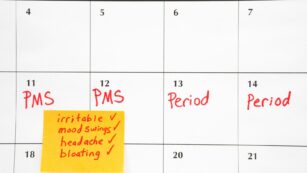Navigating your first period can feel overwhelming, but it doesn’t have to be. With the right knowledge and a few practical tips, beginners can approach this natural phase with confidence and ease. Understanding your body’s signals and knowing what to expect can make a world of difference. From choosing the right menstrual products to managing cramps and mood swings, there are several ways to make your period experience smoother. Whether you’re a young teen or someone experiencing menstruation for the first time, these beginner-friendly tips will help you feel prepared and empowered. Practices like meditation, deep breathing exercises, and mindfulness can alleviate tension and improve overall well-being. Maintaining a consistent sleep schedule is crucial for hormonal balance. Aim for 7-9 hours of sleep each night to help the body recover and regulate menstrual symptoms effectively. Avoiding smoking and excessive alcohol consumption can also reduce the severity of menstrual cramps. Both can exacerbate symptoms and disrupt hormonal balance.
Periods Tips For Beginners
 Periods can be managed smoothly with the right information and preparation. Here are some essential tips to help beginners feel more confident and informed. Menstruation is a natural process where the uterus sheds its lining approximately every 28 days. This cycle can vary between 21 and 35 days, especially when it first starts. Menstrual flow typically lasts between 3 and 7 days. Many experience various symptoms before and during their period. These symptoms vary in intensity and duration. Understanding these basics and common symptoms of menstruation can help beginners better manage their periods and seek help if needed. Engaging in essential period care involves selecting suitable menstrual products and maintaining proper hygiene. These steps ensure comfort and overall health during menstruation. Warm baths can also provide similar relief. Massage therapy can help reduce pain intensity. Gently massage the lower abdomen in circular motions. Use essential oils like lavender or peppermint for added benefit. Certain lifestyle changes can contribute to reducing menstrual cramps. Regular physical activity, such as walking, swimming, or yoga, can improve blood flow and reduce cramp severity. Engage in moderate exercise throughout the menstrual cycle. Dietary adjustments can make a difference.
Periods can be managed smoothly with the right information and preparation. Here are some essential tips to help beginners feel more confident and informed. Menstruation is a natural process where the uterus sheds its lining approximately every 28 days. This cycle can vary between 21 and 35 days, especially when it first starts. Menstrual flow typically lasts between 3 and 7 days. Many experience various symptoms before and during their period. These symptoms vary in intensity and duration. Understanding these basics and common symptoms of menstruation can help beginners better manage their periods and seek help if needed. Engaging in essential period care involves selecting suitable menstrual products and maintaining proper hygiene. These steps ensure comfort and overall health during menstruation. Warm baths can also provide similar relief. Massage therapy can help reduce pain intensity. Gently massage the lower abdomen in circular motions. Use essential oils like lavender or peppermint for added benefit. Certain lifestyle changes can contribute to reducing menstrual cramps. Regular physical activity, such as walking, swimming, or yoga, can improve blood flow and reduce cramp severity. Engage in moderate exercise throughout the menstrual cycle. Dietary adjustments can make a difference.
Managing Menstrual Cramps
Managing menstrual cramps often requires a combination of effective strategies. Several methods can help alleviate pain and improve overall comfort during a period. Pain relief methods for menstrual cramps include medication and natural remedies. Over-the-counter pain relievers like ibuprofen and aspirin can reduce inflammation and alleviate pain. Follow the dosage instructions to avoid any potential side effects. Heat therapy is another effective method. Use a heating pad or hot water bottle on the lower abdomen. This helps relax the muscles and ease cramps. Warm baths can also provide similar relief. Massage therapy can help reduce pain intensity. Gently massage the lower abdomen in circular motions. Use essential oils like lavender or peppermint for added benefit. Certain lifestyle changes can contribute to reducing menstrual cramps. Regular physical activity, such as walking, swimming, or yoga, can improve blood flow and reduce cramp severity. Engage in moderate exercise throughout the menstrual cycle. Dietary adjustments can make a difference. Incorporating anti-inflammatory foods like fruits, vegetables, nuts, and whole grains can help. Stay hydrated by drinking plenty of water, which helps prevent bloating and discomfort. Manage stress through relaxation techniques.
overall comfort during a period. Pain relief methods for menstrual cramps include medication and natural remedies. Over-the-counter pain relievers like ibuprofen and aspirin can reduce inflammation and alleviate pain. Follow the dosage instructions to avoid any potential side effects. Heat therapy is another effective method. Use a heating pad or hot water bottle on the lower abdomen. This helps relax the muscles and ease cramps. Warm baths can also provide similar relief. Massage therapy can help reduce pain intensity. Gently massage the lower abdomen in circular motions. Use essential oils like lavender or peppermint for added benefit. Certain lifestyle changes can contribute to reducing menstrual cramps. Regular physical activity, such as walking, swimming, or yoga, can improve blood flow and reduce cramp severity. Engage in moderate exercise throughout the menstrual cycle. Dietary adjustments can make a difference. Incorporating anti-inflammatory foods like fruits, vegetables, nuts, and whole grains can help. Stay hydrated by drinking plenty of water, which helps prevent bloating and discomfort. Manage stress through relaxation techniques.
Tracking Your Cycle
 Tracking your cycle is crucial for understanding and managing your period. By keeping a record of your menstrual cycle, you can predict when your next period will start and identify patterns in your symptoms. This helps you prepare in advance, ensuring you have the necessary products and pain relief methods on hand. Using apps or a simple calendar can make tracking easy and efficient. Noting the start and end dates of your period, along with any symptoms, provides valuable insights into your health. If you notice any irregularities or significant changes, it’s important to consult a healthcare professional. Empowering yourself with knowledge and being proactive about your menstrual health can make the experience more manageable and less stressful. Remember, every cycle is unique, and learning to navigate yours is a step towards better overall well-being.
Tracking your cycle is crucial for understanding and managing your period. By keeping a record of your menstrual cycle, you can predict when your next period will start and identify patterns in your symptoms. This helps you prepare in advance, ensuring you have the necessary products and pain relief methods on hand. Using apps or a simple calendar can make tracking easy and efficient. Noting the start and end dates of your period, along with any symptoms, provides valuable insights into your health. If you notice any irregularities or significant changes, it’s important to consult a healthcare professional. Empowering yourself with knowledge and being proactive about your menstrual health can make the experience more manageable and less stressful. Remember, every cycle is unique, and learning to navigate yours is a step towards better overall well-being.

